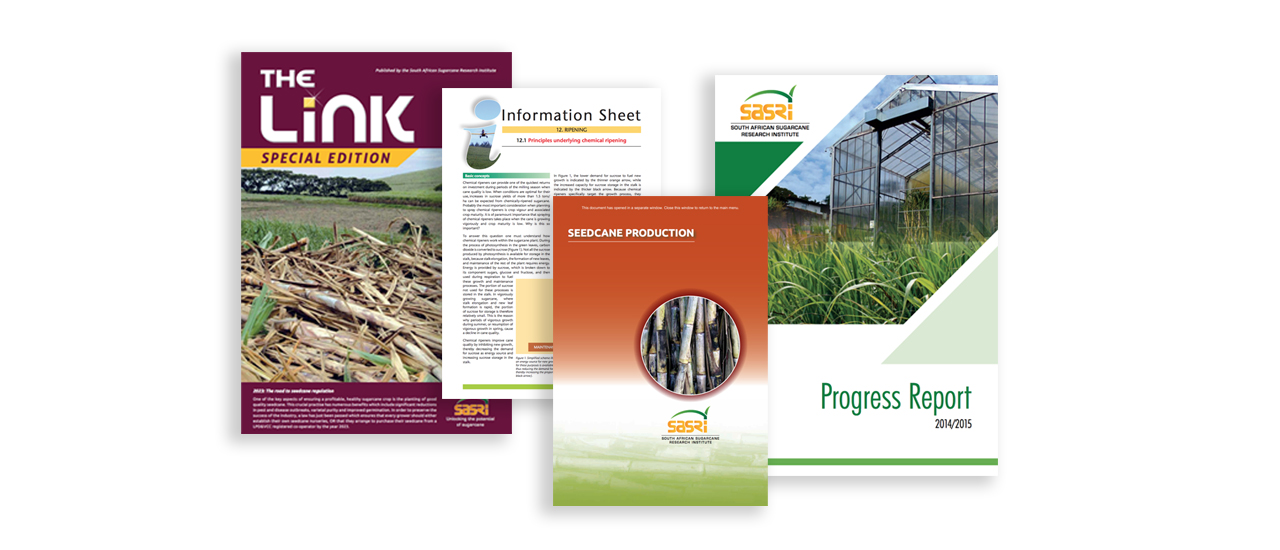The South African Sugar Association (SASA) provides a range of specialist services that enhance the profitability, global competitiveness and sustainability of the South African sugar industry.
The Industry Affairs, Cane Testing Service, National Market, International Marketing and External Affairs divisions of SASA serve in support of the Sugar Act and the Sugar Industry Agreement, and SASA also operates the Sugarcane Research Institute and the Shukela Training Centre. These divisions, as well as the internal support functions within SASA, are described below in more detail.
INDUSTRY AFFAIRS
SASA’s Industry Affairs division is responsible for the provision of a range of key support services to the Council of SASA as well as to SASA as an organisation.
The division:
- Administers and is responsible for the assurance of compliance to the Sugar Act of 1978, the Sugar Industry Agreement, 2000 (SIA) and the SASA Constitution decision-making processes of the SASA Council, its numerous Committees, its wholly owned subsidiaries and the Sugar Industry Administration Board.
- Facilitates the complex decision-making processes of the SASA Council, its numerous Committees its wholly owned subsidiaries and the Sugar Industry Administration Board.
- Provides a range of legal, regulatory, compliance and secretariat services.
- Manages the application of enterprise risk and compliance processes to ensure that all risks that could prevent SASA from achieving its organisational objectives are identified and assessed, controls monitored and tasks implemented.
CANE TESTING SERVICE
The Cane Testing Service (CTS) provides a specialist service under contract to individual Mill Group Boards to determine the quality of individual grower cane deliveries to the mill for cane payment purposes. This analytical chemistry service assesses the recoverable value content in cane delivered to the mill by growers, providing a neutral and objective basis on which to calculate recoverable value payment by miller to grower.
The CTS also provides a technical audit of the distribution between millers and growers ensuring fair and equitable division of proceeds.

Cane Testing Service: This analytical chemistry service assesses the recoverable value content in cane delivered to the mill by growers.
AUTOLAB
Autolab is a division of SASA that provides high quality, innovative and cost effective information technology solutions in the development, configuration and support services for customised computerised Laboratory Information Management System (LIMS) in cane testing and factory laboratories and for customised weighbridge software for massmeter operations. Its customers are geographically dispersed with the South African customers based at all 14 sugar mills while the non-South African customers are in Mozambique, Zimbabwe, Malawi and Kenya.
The Autolab LIMS is designed to manage growers’ estimates and allocations, enables the analysis of cane and factory products to determine grower payment in accordance with official methods and provides for the transfer of cane payment data into customer financial systems or centralised cane payment processing systems. Autolab also develops and maintains the systems that track sugarcane through the milling process for the purpose of sampling and testing by the Cane Testing Service (CTS) laboratories.
The Autolab LIMS is also used by process, refinery, downstream, sugar terminal and fertiliser advisory service laboratories. The sugar mill process functionality includes analysis of factory products, calculating factory stock and recoveries and the calculation of factory efficiencies. The laboratory modules interfaces with laboratory instruments to enable the automatic capture of sample results.
Autolab provides 24/7 LIMS support to the sugar industry during the crushing season and undertakes projects to develop new functionality and enhance system reliability.
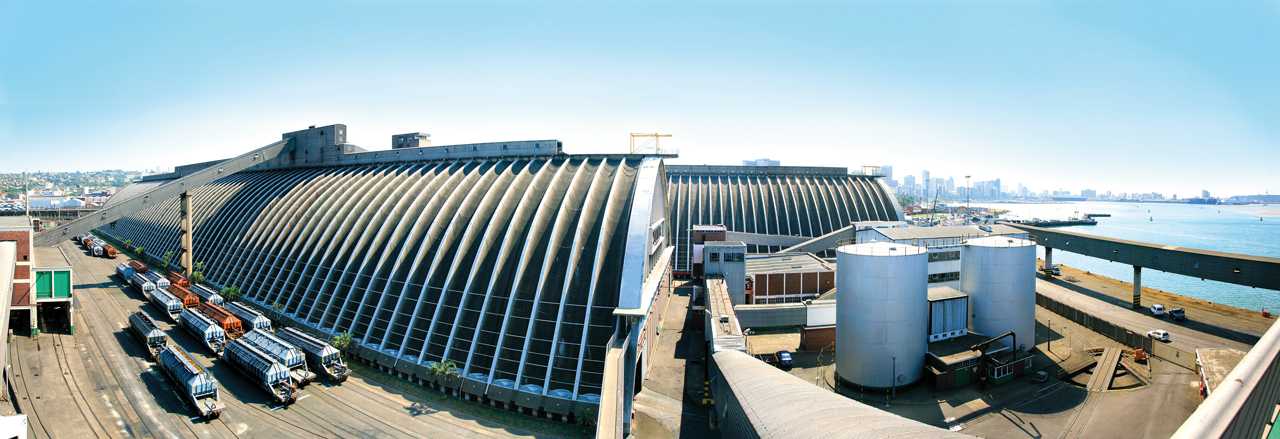
SASA’s Sugar Terminal, Maydon Wharf, Durban
SUGAR MARKETS AND LOGISTICS
The division is responsible for managing industry matters that affect the national market for sugar, including statistically analysing sugar sales, supplies and demand, researching drivers of sugar demand, monitoring of the sugar tariff regime, administering aspects of SACU/ SADC sugar agreements and the administration of industrial rebates.
The marketing, sales and logistics related to South Africa’s bulk raw sugar is performed by the division. The division focuses on achieving maximum net proceeds within an acceptable level of risk. The raw sugar is sold to refineries in South Africa for export to the European Union, the United States, Japan, China, Malaysia, Indonesia and other markets, either directly or through international trade houses.
Price risk is managed by hedging the value of raw sugar exports on the InterContinental Exchange ICE US Futures No 11. Bulk raw sugar is exported through SASA’s Sugar Terminal in Durban and the STAM Terminal in Maputo, in which SASA is a shareholder.
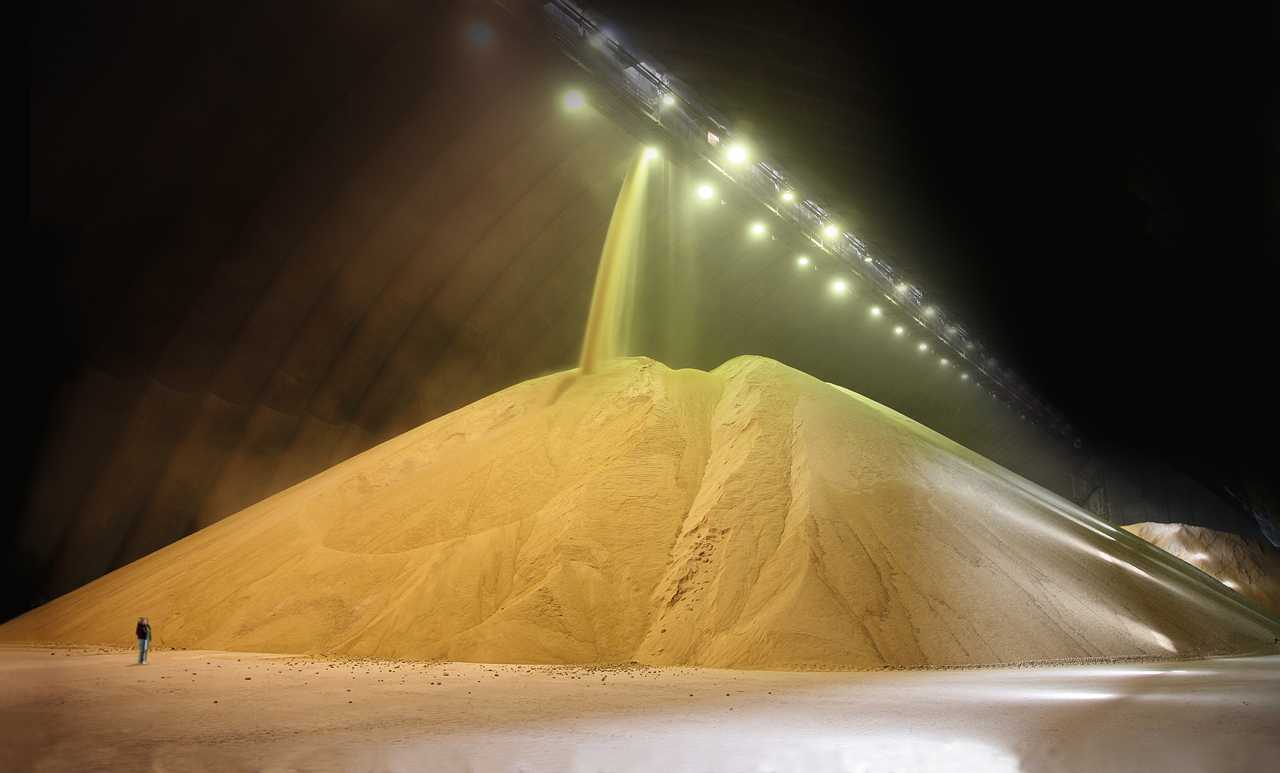
Inside one of SASA’s Sugar Terminals: The marketing, sales and logistics related to South Africa’s bulk raw sugar is performed by SASA’s Sugar Markets and Logistics division.
EXTERNAL AFFAIRS
The External Affairs Division supports the sustainability of the sugar industry through policy advocacy, stakeholder engagement, communications and media and, the development and implementation of industry strategies. The Division provides strategic support by identifying and addressing constraints, opportunities, relationships and perceptions impacting all dimensions of the industry.

This is done by developing and maintaining a well informed and effective network of stakeholder contacts (in particular those responsible for formulating policies that may affect the industry) and pro-actively communicating strategic positions in specific areas to these stakeholders. By doing this, the Division enables the industry to manage threats as well as utilise opportunities at the regional and international level.
The External Affairs Division provides specialised support in the fields of Policy Liaison, International Affairs, Renewable Energy, Nutrition, Natural Resources, Land Reform and Rural Development and Corporate Social Investment and Communications, Publications and Public Relations.
SOUTH AFRICAN SUGARCANE RESEARCH INSTITUTE
The South African Sugarcane Research Institute (SASRI) is the leading sugarcane agricultural research institute in Africa. The Institute is world renowned for its research into the development of new sugarcane varieties and improvement of crop management and farming systems to enhance profitability. Effective technology development and knowledge exchange make a significant contribution to the sustainability of the industry.
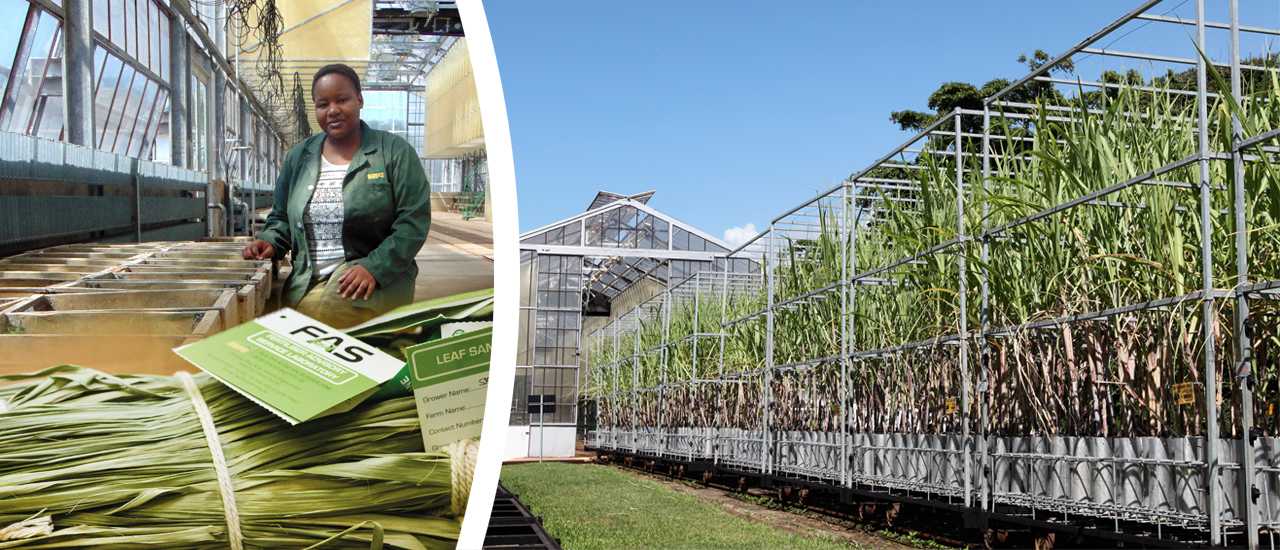
SASRI – the leading sugarcane agricultural research institute in Africa.
Research at SASRI is clustered within four multi-disciplinary programmes:
- Variety Improvement seeks to breed and select high yielding, pest and disease resistant varieties that meet industry requirements, using both conventional breeding and modern molecular technologies. Improving efficiencies in the development of superior sugarcane varieties and enabling appropriate variety choices for cultivation are key focus areas.
-
Crop Protection research is aimed at minimising the impact of weeds, pests and diseases on crop yields in environmentally and economically sustainable ways. Emphasis is placed on:
- developing integrated pest and disease management practices; and
- mitigating potential biosecurity threats through the development of proactive countermeasures and threat-specific incursion plans.
- The Crop Performance and Management programme focuses on enabling production of high quality sugarcane through the development of management practices to support appropriate use of chemical ripeners, fertilisers and soil amendments. Additional focus is placed on optimising water use and harvesting practices.
- The Systems Design and Optimisation programme is directed towards investigating and developing innovative systems that optimise crop production through modeling, technology design and a farming systems approach. Development of appropriate technology transfer tools and practices is recognised as fundamental to improved adoption of research advice and sustainable sugarcane production.
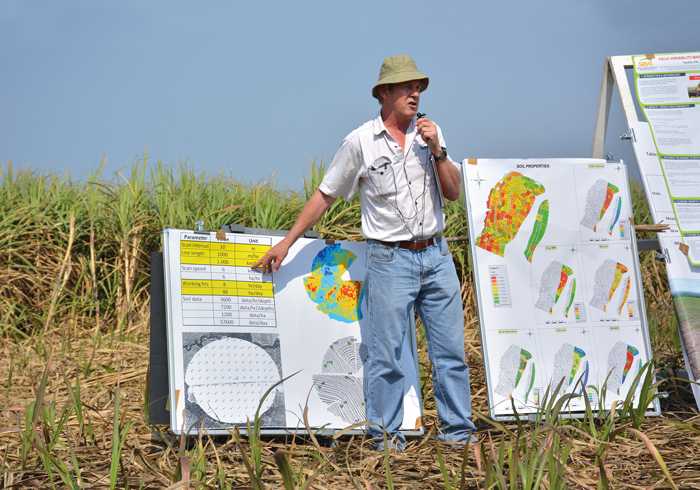
SASRI’s Extension Service provides the essential link between SASRI researchers and farmers through consultation and feedback. The Extension Service’s role is to facilitate the adoption of technology and better management practices that encourage responsible and sustainable land use and deliver optimal productivity and profitability. The Extension Service also communicates stakeholder needs back to SASRI.
The Industry’s Biosecurity function as prescribed in the Sugar Industry Agreement is also integrated into SASRI’s portfolio. The purpose of this function is to manage and protect the industry from known biosecurity threats including the monitoring for potential incursions from new pests and diseases.
A range of advisory services, is enabled by the research that is conducted at SASRI. These services include advice on agrochemical stewardship, quarantine facilities and expertise, alien invasive weed biocontrol, crop forecasting, climate and related data, real time irrigation advice, mechanisation advice, GIS and mapping support.
Other specialist services are provided on a user-pays basis including specialist advice on grower problems as well as soil, leaf, fertiliser and water analyses through the Fertiliser Advisory Service (FAS), RSD and nematode diagnostic services, variety fingerprinting and testing of new agrochemicals. Short courses in sugarcane agriculture at the junior and senior levels are also held annually.
SHUKELA TRAINING CENTRE
The Shukela Training Centre (STC) is a wholly owned subsidiary of the South African Sugar Association (SASA). STC was established in 1972 and is dedicated to the provision of agricultural skills and qualifications and apprentice/artisan and maintenance-worker training. The STC is the preferred training provider for South African and SADC sugarcane farmers and sugar producing companies as well as numerous other companies and some private individuals.

SASA’s STC is dedicated to the provision of agricultural skills and qualifications and apprentice/artisan and maintenance-worker training.
The STC offers qualifications accredited by various Sector Education and Training Authorities (SETAs), and the Quality Council for Trades and Occupations (QCTO). As such, STC is an accredited non-sector based skills development provider and an accredited trade test centre. The STC keeps abreast with the changing skills development landscape by having its senior employees participating in the national curriculum development initiatives.
The STC has expanded its scope of agricultural training to include other levels and certificate courses in farming. Agricultural skills training that is conducted on-farm continues to be a popular method to assist with the improvement in farm productivity. The on-site accommodation and associated catering service allow companies from a wide geographical area to benefit from the services of our excellent facility.
FINANCE
The Finance Division ensures the responsible custodianship of budgets and resources made available to SASA by the industry. In achieving this, it provides expert and comprehensive centralised financial services to the SASA divisions, such as the provision of financial advice, budgeting, financial reporting, procurement, treasury, payroll and taxation. It manages SASA’s ability to obtain credit facilities and SASA’s exposure to financial loss, financial risk, market risk, fraud and error. In addition, the division is responsible for Umthombo Agricultural Finance which contributes mainly to the sustainability of small-scale grower sectors through the provision of financial services.
INFORMATION SYSTEMS
The Information Systems Department provides technical support to computer users in the SASA divisions. The department is responsible for the design, implementation and maintenance of all computer network services. The weekly processing of the Industrial Systems that determine cane payment amounts for growers who have delivered sugarcane to the mills is also performed by the department.
HUMAN RESOURCES
As a provider of specialist services, SASA’s performance and service levels are highly reliant upon the performance and service of SASA’s employees. The diversity of the skills SASA employs, ranging from high level specialists to unionised industrial and agricultural labour, and the wide geographical spread of our operations, makes the effective management of people, their knowledge and their performance particularly important.
In support of this need, the Human Resources Division provides a comprehensive range of services to managers and employees in SASA, all of which aim to resource the organisation with highly competent and effective people who are committed to serving the best interests of the South African sugar industry.
